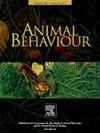科斯塔蜂鸟的开放式发声学习
IF 2.1
2区 生物学
Q2 BEHAVIORAL SCIENCES
引用次数: 0
摘要
我们在此研究哥斯达黎加蜂鸟(Calypte costae)的发声学习是否具有开放性。开放式学习是指发声学习动物在达到性成熟后记忆并学习将新的歌曲材料纳入其发声曲目的能力。开放式发声学习动物之所以能够在成年后学习,是因为它们的敏感期从不关闭,或者敏感期会随季节重新开放。在之前的实验中,我们将 18 只单独饲养的雄性科斯塔蜂鸟从羽化(孵化后第 21 天)开始在隔离室中饲养到大约 1 岁。在此期间,我们对它们进行了辅导,并让它们学习各自特定且稳定的鸣叫。在此,我们报告了当我们将8只(2017年)和6只(2018年)这些1∼1岁的鸟类移至两个室外鸟舍的群居环境中,让它们与其他成年科斯塔蜂鸟在身体、视觉和听觉上接触时发生的情况,这些成年科斯塔蜂鸟所唱的歌曲是每个个体以前从未接触过的。其余四只 1 岁的鸟儿(2018 年)则在第二年作为对照被隔离饲养,然后在 2 岁时首次相互接触。在 2 个月内,所有 1 岁大的鸟都迅速改变了它们的歌声,发出了每个鸟舍独有的新歌声。而第二年仍处于隔离状态的对照组鸟类则没有改变它们的歌声。当这些第二年的鸟被转移到鸟舍,并在 2 岁时第一次接触到新歌声时,它们的歌声也发生了变化。虽然更多的实验很重要(例如,对野外饲养的成鸟进行辅导),但我们的研究结果表明,科斯塔蜂鸟至少在第三年可以进行开放式的声音学习。本文章由计算机程序翻译,如有差异,请以英文原文为准。
Open-ended vocal learning in Costa's hummingbird
Here we examine whether vocal learning in Costa's hummingbird, Calypte costae, is open-ended. Open-ended learning is the ability of a vocal learning animal to memorize and learn to incorporate new song material into its vocal repertoire after reaching sexual maturity. Open-ended vocal learners are able to learn as adults because they have either a sensitive phase that never closes or a seasonal reopening of the sensitive phase. In prior experiments, we raised 18 individually housed male Costa's hummingbirds in isolation chambers from fledging (day 21 posthatch) until they were approximately 1 year old. During that time, they were tutored and learned song that was individually specific and stable. Here we report what happened when we moved cohorts of eight (in 2017) and six (in 2018) of these ∼1-year-old birds to communal housing in two outdoor aviaries, placing them in physical, visual and acoustic contact with other adult Costa's hummingbirds that sang songs to which each individual had never previously been exposed. The remaining four 1-year-old birds (in 2018) were instead kept in isolation for their second year as a control, then first exposed to each other at 2 years of age. Within 2 months, all of the 1-year-old birds rapidly changed their songs to produce novel songs that were unique to each aviary. The control birds that remained in isolation for a second year did not change their songs. These second-year birds then changed their songs when they were moved to the aviaries and exposed to novel song for the first time at 2 years of age. Although additional experiments are important (e.g. tutoring adults raised in the wild), our results show that Costa's hummingbirds have open-ended vocal learning through at least their third year.
求助全文
通过发布文献求助,成功后即可免费获取论文全文。
去求助
来源期刊

Animal Behaviour
生物-动物学
CiteScore
4.60
自引率
8.00%
发文量
236
审稿时长
10.2 weeks
期刊介绍:
Growing interest in behavioural biology and the international reputation of Animal Behaviour prompted an expansion to monthly publication in 1989. Animal Behaviour continues to be the journal of choice for biologists, ethologists, psychologists, physiologists, and veterinarians with an interest in the subject.
 求助内容:
求助内容: 应助结果提醒方式:
应助结果提醒方式:


